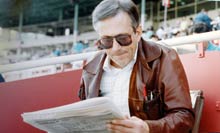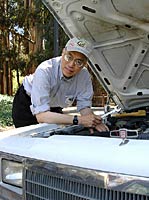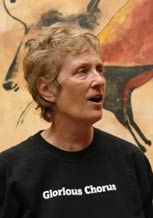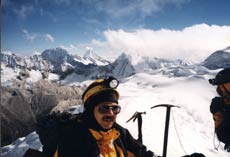Berkeleyan
The secret lives of faculty
![]()
| 26 August 2004
Among the 2,500 or so faculty members at Berkeley are 8 Nobel laureates, 19 MacArthur Fellows, and countless other academic luminaries. But did you know that the faculty also includes a veteran gambler, a used-police-car enthusiast, a classical chorister, and a world-traveling mountaineer and river guide?
Amazingly, given their teaching and publishing loads, many Berkeley profs still find time to pursue avocations far outside their academic fields. Inspired by the College of Engineering’s look at “Life Outside the Lab” (www.coe.berkeley.edu/forefront/fall2003/life.html), we reached out to departments around campus in search of faculty with interesting double lives — and found more than we bargained for. In this excerpt from a two-part series on the campus NewsCenter (www.berkeley.edu/news/media/releases/2004/06/28_hobbies.shtml), law professor Jesse Choper reveals his racetrack predilection; George Chang of nutritional sciences tells why he’s “CopCar George”; archaeology’s Ruth Tringham sings the praises of the San Francisco Symphony; and physics professor Alex Zettl tells why he likes climbing into thin air.
 Jesse Choper at Golden Gate Fields, circa 1987. (Photo courtesy Jesse Choper) |
Name Jesse Choper
Title Earl Warren Professor of Public Law, Boalt Hall School of Law
Hobby Horse races
When he started “A colleague took me out 35 years ago and I was captured by it.”
Degree of obsession “It’s a full-time hobby, and my only one. I go every weekend, either Saturday or Sunday, to any track that’s open — Golden Gate Fields, Bay Meadows, to Pleasanton, to Santa Rosa, to Stockton, even county fairs when they’re the only race in town.”
Level of spousal indulgence “Once or twice a year she’ll come along to the track.”
What the racetrack offers that academia doesn’t “Someone close to me said I was doing the same thing as I do at work — analyzing the material and trying to pick the winner.”
Proudest moment “I bet exotic bets — trifectas [where he predicts the first, second, and third finishers] and ‘pick threes’ or triples [where he picks the winners of three successive races]. My favorite day is not the one when I won the most money — one big bet on the exotic that won an amount in the low five figures — but the day I won six or seven of the 19 races I bet that day. But as someone once said, ‘The best day you can have is a winning day at the races, and the second-best day is a losing day at the races.’”
Going to the track is better than therapy because … “It certainly does take your mind off your other concerns of the day. The cost is very modest — sure, you lose a little bit over the course of time, but there’s no hobby that’s as reasonably priced.”
 George Chang with his latest old police car. (Bonnie Azab Powell) |
Name George Chang
Title Associate Professor of Nutritional Sciences and Toxicology
Hobby Used police cars
Nickname CopCar George
When he started “I got my first police car from UC Surplus in the early 1970s, for myself. Then, when my kids were old enough, I wanted big, safe cars for them to drive. And if they didn’t have good mileage, that would be good, because the kids would drive less. I’ve owned about a dozen over the years and have two Ford Crown Victorias at the moment.”
History of hobby “I’ve been interested in cars all my life. When I was 7, my dad bought a brand new car. We were so excited. Pretty soon I fished a screwdriver out and unscrewed a few screws, and then unbolted a part and put it back. I started to do that a lot. Occasionally I would break something and I would feel very bad. But then, after a couple of weeks, I’d be taking something off again. My dad put up with it, I think, because he realized eventually he would have an in-house mechanic. By the time I was in junior high I was taking care of everything for his cars.”
Pros “Even though police cars have often seen rough usage, they’ve been maintained very well. And that’s really important. If I were trying to boast, I could say that I do save a lot of money by buying them at auction, although often a car I buy for a very good price needs quite a lot of repair. I’ve had some good cars and some unpleasant surprises, but on the average I do OK.”
Cons It’s hard to find parking for the police cars: “When we drive around Berkeley, we drive our mini-pickup instead.” Usually, when police cars are put up for auction, they take out the police customizations like lights, sirens, radio, and the cage between the front and back seats. “But a few times at auction I’ve gotten so interested in the engine that I’ve forgotten to check to see if they have rear door handles. So I’ve had to fashion door handles out of steel I buy at Ace Hardware.”
Level of spousal indulgence “My wife’s been an angel about it. She does come to the auctions with me, I think because she wants to make sure if I buy a car it has door handles.”
Most harrowing moment “We had an ignition module die in our police car on the freeway at the 880 and 580 intersection. We didn’t have a cell phone and there were no call boxes, but we were right over the Oakland police station, so I was able to shout down for help. Unfortunately, in the next two hours four tow trucks went by and none of them were for us. We ended up flagging a cab, which cut across four lanes of traffic to pick us up.”
Willingness to talk about hobby at dinner parties “I’ve got a big mouth and I’ll talk about it everywhere. I’ve run Freshman Seminars on auto mechanics, because I strongly believe that everybody should realize how to unscrew a bolt and screw it back in.”
What auto mechanics offers that academia doesn’t “When you work on a car, you try something and you can get instant gratification. If it doesn’t work, you know it immediately, which is very different from academics.”
If cars could talk … “I bought a car once and only later discovered there was a bullet hole in the floor under the driver’s seat. I wish that the cars could tell stories, because I bet they’d have some interesting ones.”
 Ruth Tringham has recorded CDs with the San Francisco Symphony Chorus. (Bonnie Azab Powell photo) |
Name Ruth Tringham
Title Professor of Anthropology (specializing in archaeology)
Hobby Singing second alto for the San Francisco Symphony Chorus
When she started singing “Music has always been a big part of my life. I played violin from age 9 all through high school in England; after that, I played guitar and sang folk songs — it was that time, you know. I started choral singing in Boston, and sang with the California Bach Society here. After a couple of years of lessons in sight reading and voice projection, I joined the Symphony Chorus in 1984, and I’ve been singing for it ever since.”
Hours per week “It can take up quite a lot of time when we’re doing concerts, sometimes every night for three hours. It’s at least three hours per week minimum. I usually do about five performances a year, which is basically a full program. The chorus’s paid members — there are about 30 of them, versus 150 unpaid — have to do every performance, including smaller chamber works.”
Level of partner indulgence “My partner sings professionally, so there’s a lot of music in our house.”
Achievements Has recorded several CDs with the symphony, including a Grammy Award-winning recording of Carl Orff’s Carmina Burana with Herbert Blomstedt conducting.
Most magical moment “We did the Brahms Requiem in 2001, right after September 11, and it was just exquisite. It brought tears to my eyes. Of course that also makes the voice go, but I’ve never felt anything like that.”
Most nerve-wracking moment “The symphony makes chorus members re-audition every other year.”
What singing offers that academia doesn’t “The chorus is a great equalizer. And that’s thrilling when you deal with students and the university hierarchy every day. I’ve also made good friends there who have nothing to do with the university. They have no idea what I do, and I like that.”
Chances of someday chucking career for it “Never. I know what professional singers have to go through and I wouldn’t like to do that to myself.”
Singing is better than therapy because … “It’s like shouting therapy, only with a beautiful sound. You’re all in this together, making music, with the power of all those voices and the orchestral sound — it just gives me goosebumps. Sometimes before rehearsal I think, ‘Oh, I’m too exhausted,’ but as I sing it rejuvenates me. I end up re-energized, all the stress gone. In a concert it’s even more intense — usually after a concert I demand that someone take me out for a drink to calm down.”
 Alex Zettl on Huascaran, in the Peruvian Andes. (A. Clare photo) |
Name Alex Zettl
Title Professor of Physics
Hobby Mountaineering
Is that like rock climbing? Not exactly — rock climbing is just one part of general mountaineering, which also includes ice climbing and mixed climbing (rock and snow). Zettl also does “expedition climbing,” in which a team of climbers takes days or weeks to work its way up and down a mountain, ferrying supplies to higher and higher camps.
When he started “When I was around 14. My dad used to do rock climbing, and he was interested in backpacking the Sierra Nevada with me, which was essentially in our backyard. Then we did the Cascades, Mt. Rainier, the Alps. It just slowly evolved into other countries. I’ve been on about 20 expeditions: in the Himalayas — both Pakistan and Nepal, near Mt. Everest — as well as in South America, New Zealand, Africa, and, recently, in Alaska.”
Time commitment “Many of the team members I go with are professional mountain guides; they do this yearround. For their vacation, they do harder mountains with me. So I try not to get out of shape. I don’t use elevators, ever; I’m constantly running up and down the stairs of the physics building’s eight floors. A typical Alaska expedition climb will be about three weeks, climbing continuously on the mountain.”
Level of partner indulgence Puts up with it off and on, comes along on some trips.
What mountaineering offers that academia doesn’t “I just love being outdoors — I also do white-water kayaking and rafting as a river guide. Mountaineering and physics have parallel challenges: You need a plan of attack, you have to work out the logistics, and you don’t know what you’re going to find. Nature always has a surprise for you, in the lab or in the mountain.”
Pros “The vistas are fantastic; the areas are very pristine. Even mountains that are supposedly getting ‘crowded’ have technical routes with nobody else on them where you can be alone for several weeks.”
Cons “Just about every time on a mountain, you’ll experience avalanches coming down. You just try not to get hit. I’ve done solo climbing in the Andes, when you always worry about falling into crevasses. I’ve been in many situations where it gets a bit dicey, but you just have to stay calm. Also, you have to choose your partners wisely, as you’ll know the first time you have to share a tent with a person in a storm for six days straight.”
Pet peeve “It seems like people in the Alps are getting rescued all the time. I don’t think it’s very smart to build that into your plan — that you’ll just use a cell phone and call a helicopter if you get into trouble.”

